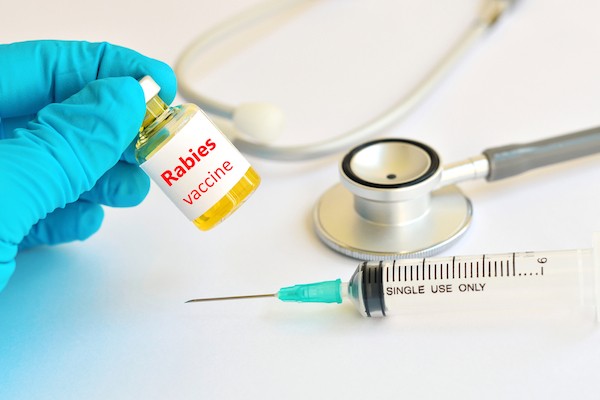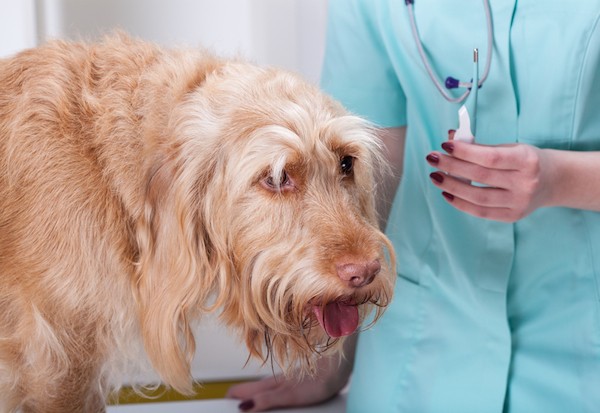Sox, a 15 year-old Terrier mix, walked into my office recently. I had never met this 17-pound love ball before but was happy to see him. At the same time, I was perplexed: Sox has no teeth, never leaves New York City, yet his owner had brought him in for a rabies vaccination. My first thought was that Sox needed a different approach, one with medicine and a personal plan, rather than a schedule of vaccinations.
A veterinarian saying don’t get a vaccination? What a shocker, right?
Not necessarily. Even the American Veterinary Medical Association (AVMA), vets’ governing body, is moving toward ending knee-jerk vaccination recommendations and instead promoting vaccinations when medically appropriate.
It’s true that vaccinations save lives, especially by protecting the puppies I see in NYC who are subjected to Parvo almost daily. But Sox was another story. Above all, we needed to look at his overall health. What was Sox eating? Was he drinking more water lately? Did he have any risk of rabies since he never left the house? Could he have transmitted rabies since he has no teeth?

Rabies vaccine by Shutterstock.
When you ask if your dog needs a vaccination, the answer from your vet may be, “I don’t know.” A vet who says, “I don’t know” is a good vet in my opinion. Because even in older animals vaccinations can save lives, but I do what is medically appropriate first: I run a titer. A titer asks the same question and tests the blood for the presence of antibodies to the disease.
If a high enough level of antibodies exist in the blood, your dog doesn’t need a vaccination. You have just saved your pet an injection and possible side effects by running a simple blood test. If not enough antibodies exist, your dog needs the vaccination. Much better and more scientific than a knee jerk reaction!
So why not just vaccinate?
First, vaccinations aren’t benign. They attack the immune system in order to get a response, and they can cause certain types of reactions, including, in rare cases, cancer.
Second, vaccines don’t always work. The main reason a vaccination does not work is if it is given when the animal’s immune system is down, whether from being sick or being stressed. And your baby is most stressed at the vet’s office!

Stressed dog at the vet’s office by Shutterstock.
This is why it’s so important to take a whole health approach, asking whether the vaccine is truly necessary and harmless before administering it.
Making vaccines as safe and effective as possible
Here are some tips for managing your pet’s vaccinations:
- Keep the visit is as stress free as possible. Treats and great smells truly do make the vaccination work better, as stress will release cortisol, which works against the vaccination. Ask that vaccination be done last.
- Make sure your baby isn’t under the weather. A complete blood count is a four-minute test in my office and is run before any vaccination if there is a question about an animal’s immune system, as it may predict the chance of a reaction.
- Know that all vaccinations are not equal. In general, your veterinarian will have safer vaccinations than those found in stores, and it is worth it to have a veterinarian build your dog an individual protocol. Ask your vet if the vaccination is the safest and most effective available. Ask who made the vaccination and why the vet chose it over another brand. The answers may surprise you and affect your decisions.
- Space out vaccinations unless your vet has a reason not to. Some of the safest vaccinations may be combination vaccinations, but others can be done at a different time.
- If you can, don’t do vaccinations during surgical procedures such as spays. Negative effects on the immune system will be amplified.
- Do a risk-benefit analysis with your veterinarian. Is this disease in my area? What are my chances of getting the disease? We don’t give rattlesnake vaccinations in NYC, but I’d want one if I lived in Arizona!
- Don’t forget about yourself! A famous immunologist vaccinates his dog against leptospirosis not because he is afraid of his dog getting it, but because his dog sleeps with his daughter and the disease is transmissible to people. Sometimes we vaccinate our dog also to protect our family.
- Make a personalized plan. What is right for you and your dog may not be right for others, and that’s okay. The best medicine I can offer is information to help you make decisions, including when not to vaccinate; be sure to check with your vet and or town regarding local rabies vaccination laws.
- Medicine is always more important than vaccinations. Address problems and always get a physical examination first. Your pet will thank you for being complete, not for being quick!
Back to Sox: He was drinking more water and was slightly dehydrated. Turns out, he had the start of a chronic kidney issue related to the immune system. With that in mind, we ran a titer to see if vaccinations were needed. Once the titer comes back, I’ll know whether to vaccinate Sox. For now, I’m happy we could find an issue before it became a problem so that we can help Sox can live a happier and healthier life with better food and kidney supplements.
About the author: Timothy Mann, VMD, is the author of The Beautiful Aardvark: A Veterinarian’s Story In Business and owner of Whole Health Veterinary Hospital and Dental Clinic in New York City, which takes a compassionate, integrative health approach to promoting the well¬being of its staff, its clients, and their pets. Previously, Dr. Mann founded and ran the Brooklyn Cares Veterinary Clinic, a veterinary practice serving over 17,000 clients in Brooklyn, New York.
The post Why I Sometimes Recommend That a Dog NOT Get a Vaccination appeared first on Dogster.
No comments:
Post a Comment